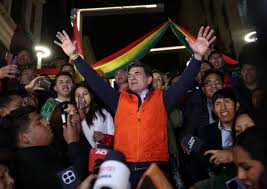
Bolivia Set for Presidential Run-off Between Centrist and Right-Wing Candidate

 :
| Updated On: 18-Aug-2025 @ 11:07 am
:
| Updated On: 18-Aug-2025 @ 11:07 amSHARE
Bolivia is heading toward a presidential run-off election between centrist Rodrigo Paz of the Christian Democratic Party (PDC) and conservative former interim President Jorge “Tuto” Quiroga of the Alianza Libre coalition. This development marks the end of nearly two decades of rule by the Movement for Socialism (MAS), which has governed the country since 2005. With over 91 percent of ballots counted, preliminary results show Paz leading with 32.8% of the vote, while Quiroga trails at 26.4%. Neither candidate surpassed the required 50% majority or the 40% threshold with a 10-point lead to avoid a run-off, so a decisive election between the two is scheduled for October 19.
The election featured eight candidates ranging from far-right to left-wing political ideologies. Early polls had indicated that businessman and former planning minister Samuel Doria Medina, along with Quiroga, were frontrunners, but Paz’s unexpected surge has been described as the “biggest surprise,” especially since he was polling fourth or fifth just before the vote. Notably, Paz is considered more centrist than his father, former left-leaning President Jaime Paz.
Former leftist President Evo Morales was barred from running, and the outgoing socialist President Luis Arce—who had a falling out with Morales—chose not to run. Internal divisions within the MAS party, combined with a severe economic crisis, dampened expectations that MAS could retain power.
The official election results are expected within a week. In addition to the presidential vote, Bolivians elected all 26 senators and 130 deputies, with new officials slated to take office on November 8.
Bolivia is grappling with its worst economic crisis in a generation. Inflation is soaring at nearly 25%, and the country faces critical shortages of US dollars and fuel. In the lead-up to the election, protests erupted across Bolivia as citizens expressed frustration over skyrocketing prices and long waits for basic necessities like fuel and bread.
During Morales’s tenure from 2006 to 2019, Bolivia saw more than a decade of strong economic growth and significant Indigenous empowerment. Morales nationalized the gas sector and invested the proceeds into social programs, successfully halving extreme poverty. However, a lack of new gas projects during his administration, combined with his outspoken stance on environmental and climate issues, caused gas revenues to decline sharply—from a peak of $6.1 billion in 2013 to $1.6 billion in 2024.
Bolivia’s other major resource, lithium, remains largely untapped underground. Consequently, the government is nearly out of foreign exchange reserves needed to import essential goods such as fuel, wheat, and foodstuffs. This resource scarcity, coupled with economic mismanagement and political instability, has intensified the country’s hardships and fueled public discontent.
In summary, Bolivia’s upcoming run-off election between Rodrigo Paz and Jorge Quiroga symbolizes a significant political shift away from MAS’s long-standing socialist governance. The country faces daunting economic challenges, including inflation and shortages, which will weigh heavily on the new government’s agenda as it prepares to take office in November. The election results and political realignment come at a critical juncture for Bolivia’s future stability and economic recovery.